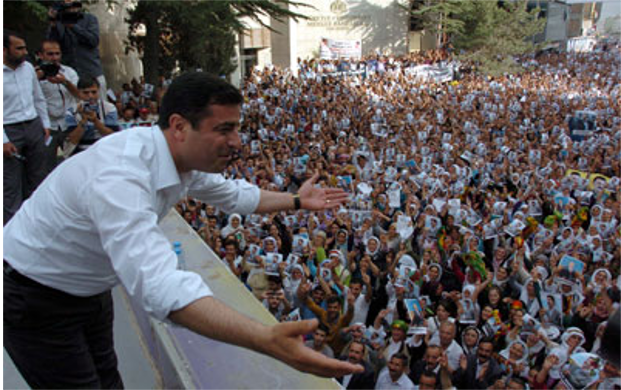![]() By Deniz Torcu
By Deniz Torcu
On the afternoon of Sunday, 7 June, citizens of the Republic of Turkey followed their post-general election ritual: they turned on their TVs to catch the incoming results, poured a cup of tea and engaged in some country-saving debate that always pairs well.
For the past three elections, the only “winners” have been the voters of the governing Justice and Development Party, with celebrations kicked off by one of Mr. Erdogan’s infamous “balcony speeches” in which he would proudly embrace the will of the people, dutifully accepting his role as the leader of the country.
This is a turning point for Turkish democracy.
However, last Sunday evening, for the first time in more than a decade, something extraordinary happened that even Mr. Erdogan himself did not see coming. The Justice and Development Party (AKP) failed to secure the 400 parliamentary seats necessary to amend the constitution, which would have provided an avenue towards a presidential system of government and, no doubt, paved the way for a new Erdogan Dynasty. What’s more, they also lost an absolute majority which allowed them to secure 13 years of single-party rule in Turkey. AKP garnered 40.8% of the vote and will now claim just 258 seats in Parliament.
And this wasn’t the only good news for Turkish democracy.
The leftist People’s Democratic Party (HDP) promotes pro-libertarian agendas for not only Kurds but also for the further empowerment of women, LGBT communities and environmental activists. Furthermore, they have been successfully leveraging a broad and uniting message for all peoples in the country, illustrated by their surpassing the 10% threshold and obtaining 13,16% of the vote, thus, ensuring 80 seats in Parliament.
This is a turning point for Turkish democracy. The entrée into the parliamentary scene of a pro-Kurdish party with broad support, not only from the Kurdish minority but from all groups in society, is a breath of fresh air in the old, antiquated world of Turkish politics and traditions.
The HDP was able to adopt a pro-Kurdish agenda that limited the opposition and successfully embraced the Gezi Park Movement youth, along with secular Turks and liberals. These groups identify as libertarian and left-wing, but no longer feel represented by the traditional center left, the Republican People’s Party (CHP).
With the Justice and Development Party losing its absolute majority and, thus, their single-party rule, what is going to happen now?
Meanwhile, the CHP obtained 25% of the vote and secured 132 seats in Parliament. The Nationalist Movement Party (MHP) is the fourth party to secure parliamentary seats, clinching 80 with 16,33% of the vote.
With the Justice and Development Party losing its absolute majority and, thus, their single-party rule, what is going to happen now?
Well, the AKP will have to form a coalition—translating to a minimum of 276 seats—by knocking on some of their opponents’ doors. However, that’s not going to be easy for Mr. Erdogan & Company, since all opposition in Turkey is united against the AKP’s long history of Islamism and government oppression.
As the Justice and Development Party is brainstorming new ideas to stay on top in government, leaders of the three opposition parties already announced that they will not accept a coalition offer from the AKP. Instead, they have suggested the possibility of forming a coalition amongst themselves in an effort to enhance democratic values and to heal the damage caused by the AKP.
As good as that sounds, the possibility of a three-party coalition in order to defend against AKP rule sounds too difficult to achieve. Although the opposition is united against AKP ideals, there are some serious issues that the pro-Kurdish HDP and the Turkish nationalist MHP, especially, would not be able to resolve.
Thus, this leaves Turkey with two possible outcomes: one of the three opposition parties accepts the AKP’s offer to form a coalition or no new government forms and Mr. Erdogan calls an early parliamentary election after 90 days.
The unexpected outcome of the elections has also had an effect on the market—a revelation that the AKP is more than likely to exploit—with the Turkish lira hitting a record low 2.80 to the dollar and 3.09 to the Euro. The Central Bank of Turkey had to step in and save the currency from falling even lower. Unfortunately, market instability is here and likely to stay, at least until a new coalition is formed.
We, the ones who finally said “enough” to the 13-year reign of repression, are filled with hope for a more democratic Turkey.
The traditional and infamous “balcony speech” has yet to be given by Mr. Erdogan, who himself sees that the Turkish people are leery of his ambitions to change the country’s political system and crown himself the supreme leader.
Meanwhile, we, the ones who finally said “enough” to the 13-year reign of repression, are filled with hope for a more democratic Turkey, a better foreign policy that would allow us to regain our long lost alliances, actual freedom of expression that is not an exclusive privilege to AKP followers, and rapprochement with the European Union.
After waiting for more than a decade, this is a moment of joy; and moments of joy require celebration. Hence, let the halay begin!



